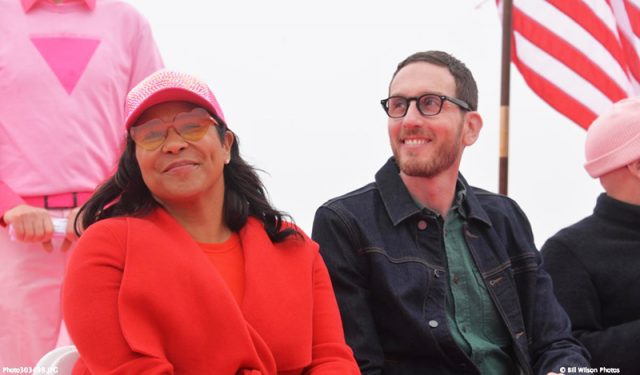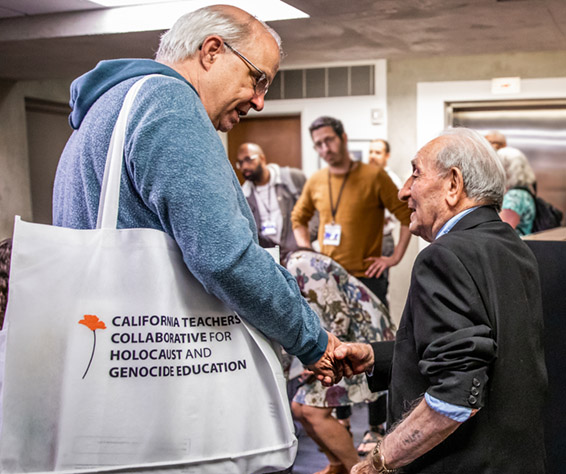- LGBTQ+
- News and Impact
- Holocaust Center
As he does each year, state Senator Scott Wiener joined public officials and hundreds of volunteers on Saturday, June 8 for the 2024 Pink Triangle Ceremony, celebrating the annual installation of San Francisco’s singular Pink Triangle.

San Francisco Mayor London Breed and California State Senator Scott Wiener attend the 2024 Pink Triangle Ceremony on Twin Peaks. Photo by Bill Wilson.
The Pink Triangle was founded 29 years ago by Patrick Carney as a guerilla arts project. Covering an acre on Twin Peaks, viewable for miles around, it has become synonymous with Pride Month in San Francisco. The symbol, once used by the Nazis to identify and shame homosexuals in concentration camps, is now embraced by the LGBTQ community as a symbol of pride.
“We brand ourselves with the pink triangle out of camaraderie with those who were forced to wear the pink triangle during the Holocaust,” Carney said in an interview with CBS News Bay Area. Over the decades he has dedicated to this San Francisco tradition, Carney continues to educate people about its origins as a symbol of hate.
In a 2022 op ed Senator Wiener co-wrote with Joyce Newstat, member and former Chair of JFCS’ Holocaust Center Advisory Committee, the authors explained the very personal significance the pink triangle has for them:
The pink triangle reminds us all of what can happen when bigotry becomes law. One of us is a child of a Holocaust survivor, and we are both members of the LGBTQ+ and Jewish communities. The impacts of hatred, antisemitism, and bias are personal for us; we have witnessed and experienced their effects first-hand.
Today, in eerie echoes of the past, we are faced with alarming incidents of hate and antisemitism and regressive laws that would strip hard-won rights and protections from vulnerable members of our communities. It has never felt more urgent to apply the lessons we have learned from the past and to stand up against extremism using the most effective tool we have to develop empathy and stop hate: education.
Results of a nationwide survey released in 2020 by Echoes & Reflections, a partnership program of USC Shoah Foundation, the Anti-Defamation League, and Yad Vashem (the World Holocaust Remembrance Center), found that college students who had received Holocaust education in middle or high school are more open to differing viewpoints, more likely to challenge intolerant behavior in others, and more willing to stand up to negative stereotyping. Surveyed students demonstrated higher critical thinking skills and a greater sense of social responsibility if survivor testimony was part of their learning experience.
Jewish Family and Children’s Services’ Holocaust Center has learned this from years of practice. The Center’s William J. Lowenberg Speakers Bureau brings Bay Area Holocaust survivors to middle and high schools, colleges, and organizations to share their stories of courage and resilience. And through rich educational experiences and resources about the Holocaust and genocide, the Holocaust Center inspires students to stand up against hatred and intolerance.

A teacher participant shakes hands with Joe, a Holocaust survivor, at the California Teachers Collaborative for Holocaust and Genocide Education’s first Summer Institute, June 2023.
Launched in 2021, the JFCS-led California Teachers Collaborative for Holocaust and Genocide Education is expanding the Holocaust Center’s mission to empower educators to eradicate hate. The first of its kind in the nation, the Collaborative unites California’s 14 leading institutions for Holocaust and genocide education, as well as community leaders from diverse ethnic groups across the state. Through lesson plans, expert-led trainings, and a wealth of educational resources, the Collaborative empowers and unifies educators in teaching the lessons of history and about what happens when bias goes unchecked.
We are proud to be taking a leading role in bringing Holocaust education to students across the state of California. As Senator Wiener reminds us:
“Though the pink triangle is taken down at the end of Pride Month, it is our collective responsibility to continue showing our pride all year long, and always to stand and speak out against hate in all its forms. Together, our actions will create a more just and compassionate world for everyone.”
We can’t do this work alone! Your contribution ensures the future of educational programs that reach and inspire more than 28,000 students, teachers, and community members each year.
